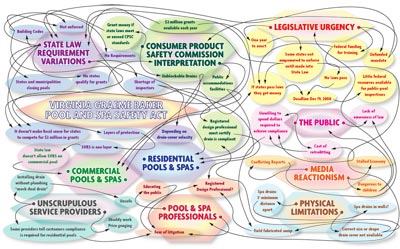Twisted Topic
The industry is still struggling to figure out the Virginia Graeme Baker Pool and Spa Safety Act.

Click on the image for a more detailed view.

Click on the image for a more detailed view.
Which pools are affected by the Virginia Graeme Baker Pool and Spa Safety Act?
The Virginia Graeme Baker Pool and Spa Safety Act is going on three years old, but questions still persist.
To find out how well industry members understand the first federal pool and spa safety law, Pool & Spa News conducted a simple survey of service technicians.
The good news is most respondents realize that the law applies to all commercial pools nationwide. The bad news is that a full 30 percent do not understand the scope of the law, believing that it either applies to commercial pools only or, worse, only to commercial pools in certain states.
While some raise their eyebrows at this confusion, others are not surprised. The drawn-out interpretation process and the additional layers of state and local codes have given rise to misunderstandings over many aspects of the law.
It’s easy to confuse VGB with state and local codes, which often are similar, but differ in some details.
For instance, New Jersey doesn’t allow channel drains, while they are permitted under VGB. Connecticut requires a Safety Vacuum Release System on every pool, which has led some in that state to believe the mandate is actually stipulated in VGB. And Florida calls for velocities of 1.5 fps or less through its drains, whereas VGB allows up to 6 fps.
Moreover, many building officials are still trying to mesh the finer points of VGB and state codes in their own minds.
Paulette Pitrak often finds herself fielding code questions from industry members, as well as inspectors and building officials in her area.
“Members are on site, and they’re with a code inspector,” says the deputy executive director of the Northeast Spa and Pool Association. “Or the health-code inspector doesn’t agree with the building-code inspector.”
Part of the problem, too, was the lengthy process of interpreting this law, which fell on the shoulders of the Consumer Product Safety Commission. It took six months after the passage of VGB to receive the finalized requirements for commercial pools, while the residential portion just came out earlier this year.
“[People] seemed to be familiar with VGB, then all of a sudden an interpretation for residential swimming pools came out,” Pitrak says. “Then professionals go, ‘Oh, well, if I renovate this pool, I must have to blow out the bottom of this residential pool and put in dual main drains if it’s a single drain.’ No, you don’t.”
It’s clearly the residential side of the law that has some people scratching their heads.
As of Dec. 19, 2008, any residential pool receiving a drain — whether as part of new construction or a renovation — must be outfitted with a VGB-compliant drain cover.
But this itself has caused professionals to wonder how to proceed. On new pools and existing models that need a drain-cover replacement, the answer is simple. But what about renovations that wouldn’t otherwise require a drain-cover replacement?
“Our biggest question from dealers is, ‘What’s my liability if I don’t change that residential [drain] cover?’” Pitrak says. “They’re worried about being the last person on the property, and they didn’t inform the customer that they have an old cover.”
It doesn’t help that, in an effort to get work, some pool companies have told homeowners that their residential pools must be updated for compliance.
“Some of [my customers] have started to receive fliers in the mail from companies offering to do it,” says Robert Foutz Jr., owner of Purity Pool Service in Huntington Beach, Calif. “They see the law, and they’re preying on unsuspecting homeowners.”
Foutz knows that the federal law doesn’t require residential retrofits, but he has approached local officials just to make sure he’s not missing anything.
“I can’t get a straight answer,” he says. “I’ve talked to the county department of health and they say, ‘We’re not sure on our residentials yet.’ I’m still waiting. Until I’m sure, I don’t want to tell my customers to spend thousands of dollars on what we think needs to be done — especially in this economy.”
To make matters more complicated, there’s always the swirl of informal conversations and rumor which may, or may not, be correct.
“There’s a lot of what I call parking lot information,” says Bob Nichols, owner of Glendora, Calif.-based Precision Pool Service. “That’s where one guy who doesn’t know what he’s talking about tells another guy something he doesn’t know either. And it’s totally wrong information.”
But as of now, the residential side of VGB is actually pretty simple — whenever a drain cover is changed, the new unit should be compliant. But be sure to consult state and local codes to be certain of any additional requirements.


